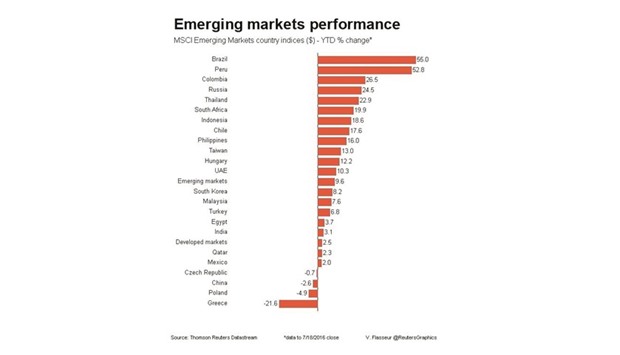Turkey’s stocks and lira fell further yesterday and local bond yields rose as Friday’s failed coup continued to pressure markets, while broader emerging stocks eased off 7-1/2 month highs.
A slight dollar rise, weakness in global stocks and a pullback in commodity prices weighed on global emerging assets, along with renewed weakness in China’s yuan, which was reported to be supported near 5-1/2 year lows by state-run banks’ dollar sales.
Turkey’s stock market opened around 1% lower, then trimmed some of those losses to stand 0.4% down. Monday’s 7% fall was the biggest daily loss since the height of the 2013 “taper tantrum”.
Shares in tourism-reliant Turkish Airlines fell 0.6% after slumping 12% to four-year lows, though they could enjoy some relief as more countries lifted restrictions on Turkey flights.
Airport operator TAV rose 1% after Monday’s 17% fall.
“There are a number of ‘black swans’ still there, especially this week as the government is still trying to grapple with what happened over the weekend.
This purge is still ongoing...
So we are still trading on this uncertainty on the domestic front,” Societe Generale strategist Roxana Hulea said.
Investors are also focusing on Turkey’s credit rating, which hangs by a thread after Moody’s, one of the two agencies that rank it investment grade, put it on watch for a downgrade.
That helped push local 10-year yields above 10% for the first time since May, up some 30 basis points since before Friday’s coup attempt, though they later eased. Five-year credit default swaps rose five basis points to 254 bps, a three-week high, Markit said.
The central bank is expected to cut overnight lending rates by 25 bps yesterday.
ING Bank analysts wrote: “A rate cut may be modestly lira-supportive to the extent to which it may ease a potential further sell-off in Turkish government bonds.”
SocGen’s Hulea also predicts a 25 bps cut, having moderated her earlier 50 bps forecast.
“It’s a compromise between signalling that things are gradually returning to normal, and actually paying attention to the fact that outflows are detrimental to Turkey.
This is something the central bank needs to tread very carefully on,” she added.
While broader emerging markets have seen little spillover from the Turkey events, MSCI’s emerging equity index eased 0.2%, snapping an eight-day streak of gains and tracking falls on European bourses. It was also hit by losses in Hong Kong and Korea while South African and Russian stocks fell around 1%, as oil and commodity prices eased.
Polish stocks lost half a per cent a day after hitting three-week highs.
The zloty retreated 0.3% against the euro from the two-week highs touched after Fitch ratings agency held off cutting the country’s sovereign rating last week.

EME
